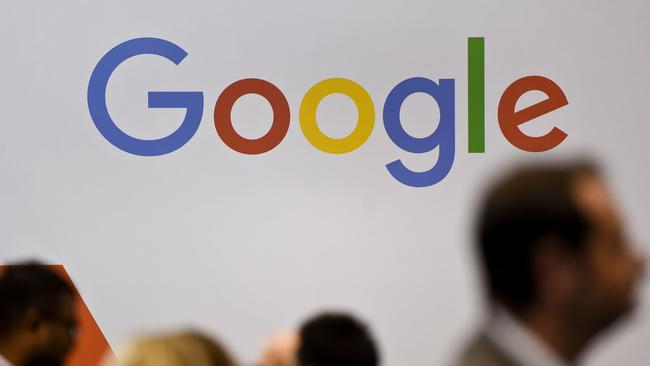Tech giants Google and Facebook face market curbs
The ACCC wants a clampdown on the market dominance of Google and Facebook, and new data collection rules.

Australia’s corporate watchdog has unveiled 11 preliminary recommendations to clamp down on Google and Facebook’s market dominance, including closer scrutiny of their activities by a government agency, new data collection rules and a review of “disparate” media laws.
The Australian Competition & Consumer Commission’s preliminary report includes a proposal that would prevent Google’s internet browser Chrome being installed as a default on mobile devices, computers and tables and Google’s search engine being installed as a default search engine on internet browsers.
As revealed by The Australian, the ACCC has also proposed that a new or existing regulatory authority investigate, monitor and report on how large digital platforms rank and display advertisements and news content.
Additional preliminary recommendations deal with copyright, and take-down orders, and the review of existing, disparate media regulations. Other preliminary recommendations suggest ways to strengthen merger laws.
ACCC chair Rod Sims said digital platforms have “significantly transformed” people’s lives, in terms of the way they communicate and the access news and information.
“But digital platforms are also unavoidable business partners for many Australian businesses. Google and Facebook perform a critical role in enabling businesses, including online news media businesses, to reach consumers. However, the operation of these platforms’ key algorithms determining the order in which content appears is not at all clear,” Mr Sims said in a statement.
“Organisations like Google and Facebook are more than mere distributors or pure intermediaries in the supply of news in Australia; they increasingly perform similar functions as media businesses like selecting, curating and ranking content,” he said.
“Yet, digital platforms face less regulation than many media businesses.
“The ACCC considers that the strong market position of digital platforms like Google and Facebook justifies a greater level of regulatory oversight,” Mr Sims said.
A spokeswoman f or US giant Google said the preliminary report examines “important topics”, but was tight lipped on the recommendations.
“As we put forward in our submission, we develop innovative products to the benefit of consumers, businesses and the economy, and we work closely with advertisers and publishers across Australia. We will continue to engage with the ACCC between now and the final report next year.”
Facebook wasn’t immediately available to comment.
The ACCC said Google and Facebook were “now the dominant gateways between news media businesses and audiences and this can reduce the brand value and recognition of media businesses.
“In addition, traditional media businesses and in particular, traditional print media businesses, have lost advertising revenue to digital platforms. This has threatened the viability of business models of the print media and their ability to monetise journalism.”
Mr Sims said “news and journalism perform a critical role in society.
“The downturn in advertising revenue has led to a cut in the number of journalists over the past decade. This has implications across society because of the important role the media plays in exposing corruption and holding governments, companies, powerful individuals and institutions to account,” he said.
In the long-awaited 378-page preliminary report, the ACCC said commercial media, in particular traditional print media, first suffered a major hit in advertising revenue with the unbundling of classified advertisements from newspapers. That led to a sharp drop in classified ad revenue to $200 million in 2016 from $2 billion in 2001.
At the same time, competition intensified from international sources and other media, both commercial and publicly funded.
The ACCC said the drop in revenue has also hit the funding of Australian news and journalism, which is a grave concern.
“The reduction in journalist numbers is important given the critical role news and journalism perform in society. Even those members of the public that do not read, watch or listen to the news benefit from the role journalism performs in exposing corruption, the creation of public debate and holding governments, corporations and individuals to account through their questioning and investigation.”
In addition to the 11 preliminary recommendations, the ACCC has also identified eight areas for further analysis, including the proposed “badging” by digital platforms of media content produced by an accountable media business.
Other areas for further investigation include options to fund the production of news and journalism, such as tax deductions or subsidies, a digital platforms ombudsman to investigate complaints and provide a timely and cost effective means to resolve disputes, and a proposal for digital platforms to allow consumers to opt out of targeted advertising.
The ACCC has spent the past year investigating the impact of digital platforms on competition in media and advertising services market, particularly the supply of news and journalistic content, as directed by the then treasurer Scott Morrison last December.
A final report will be submitted to the government by June 3.
.

The ACCC’s 11 recommendations are:
- Suppliers of operating systems for mobile devices, computers and tablets be required to provide consumers with options for internet browsers rather than providing a default browser, as well as a search engine
- Major digital companies to provide advance notice of acquisitions in Australia
- A regulatory authority should monitor, investigate and report on digital platforms
- A regulatory authority could also monitor, investigate and report on the ranking of news and journalistic content by digital platforms and the provision of referral services to news media businesses
- The government conduct a review of media regulatory frameworks
- The Australian Communications and Media Authority determine a mandatory standard regarding digital platforms’ removal procedures for copyright infringing content
- Amendments to the Privacy Act on the use and collection of personal information
- The Office of the Australian Information Commissioner to introduce a code of practice for digital platforms
- Changes to merger law
- The government adopt the Australian Law Reform Commission’s recommendation to introduce a statutory cause of action for serious invasions of privacy
- Unfair contract terms should be illegal under the Australian Consumer Law




To join the conversation, please log in. Don't have an account? Register
Join the conversation, you are commenting as Logout